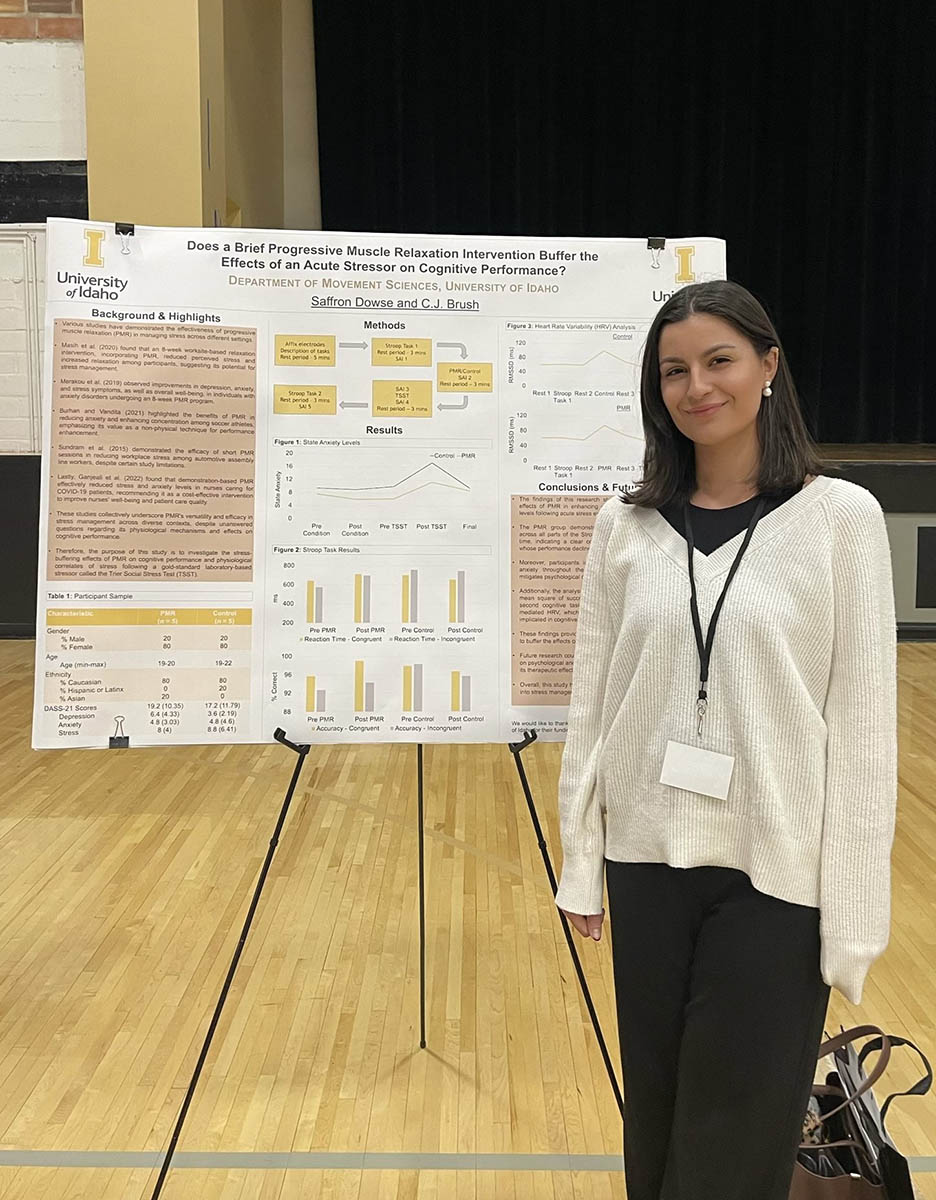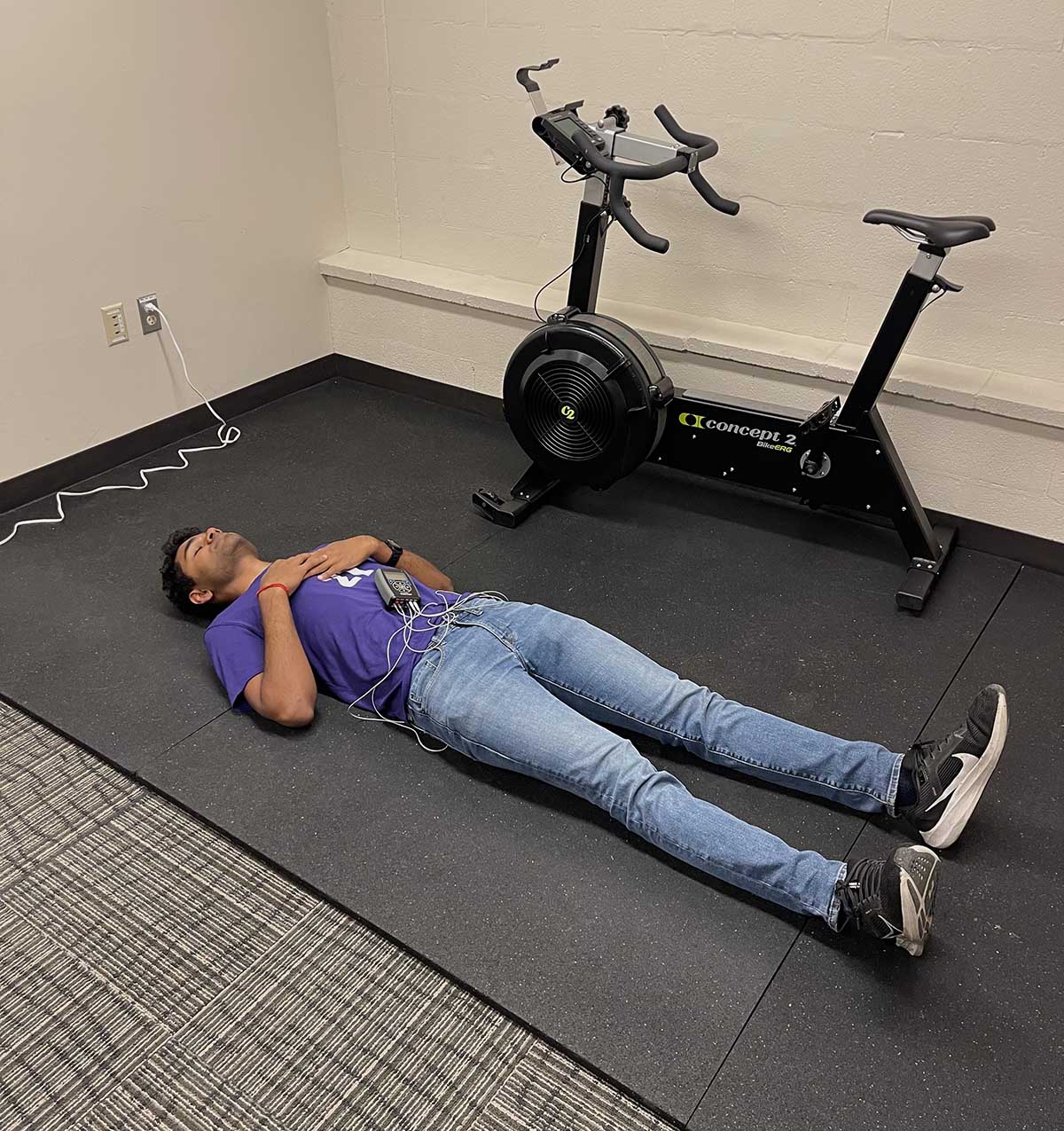Ready to Serve
Former Vandal Tennis Captain Wants to Teach Athletes to Manage Stress
As a teenager attending a tennis academy in Spain, Saffron Dowse ’24 spent hours upon hours learning how to hit perfect forehands and backhands.
But perhaps the most important lesson she took away was learning how to extend a helping hand.
Between practice sessions, Dowse and her teammates often heard presentations about different ways to relieve stress, reduce anxiety and focus on performance. Even at a young age, Dowse knew this was a topic she wanted to explore.
Prior to graduating this Spring with bachelor’s degrees in sociology and psychology, Dowse presented her findings on how progressive muscle relaxation (PMR) influences cognitive performance following short-term exposure to stress at the University of Idaho Undergraduate Research Symposium.
Working with C.J. Brush, assistant professor in Exercise, Sport and Health Sciences, Dowse wanted to better understand how stress-relieving programs like PMR affects mental and physical health and if using PMR could help individuals cope with stress.
“All of us face different stressors every day – not just in athletics, but in life, too,” said Dowse, a four-year member of the U of I Women’s Tennis Team. “I wanted to show that techniques like PMR could help people manage their stress and help them perform better.”

Past Tense
Progressive muscle relaxation is an exercise similar to yoga or meditation where an individual will tense up a muscle group, like around the neck or shoulders, hold their breath, then release the breath slowly to relax the muscles.
Dowse studied the effects of PMR on 10 subjects for her Office of Undergraduate Research project. Prior to stress exposure, half of the subjects were selected at random to use PMR techniques while the other half were assigned to a control (resting) group that did not use them.
Throughout the testing, Dowse measured participants’ self-reported state of anxiety and placed electrodes on participants to measure their cardiovascular activity by looking at their heart rate variability – the time intervals between successive heartbeats. Cognitive performance was also assessed using a computerized neuropsychological task called the Stroop test before and after exposure to the stressor. Dowse then used the data from the two groups to see if there was a difference.
I definitely believe in PMR and I think it can help people in ways that haven’t really been researched fully yet. Athletic performance, non-athletic performance – with PMR, you have a strategy that helps you calm your physical symptoms and maintain your focus. Saffron Dowse ‘24
“We wanted to look at the contributions that a stressor has on the parasympathetic and sympathetic nervous systems and how it affects cognitive function,” Brush said. “The parasympathetic system is the part of the nervous system responsible for functions that occur at rest. We want to see if this technique can keep people from going into the fight-or-flight stage of stress which may impact someone’s cognitive performance.”
Dowse’s experiment showed that the PMR group displayed better cognitive performance following exposure to stress when compared to the control group. Participants in the PMR group also reported lower levels of anxiety throughout the process, which suggests PMR could also be useful to mitigate psychological distress.
C.J. Brush, Ph.D.
Assistant Professor, Exercise, Sport, and Health Sciences

A Perfect Match
Dowse has been playing tennis since she was four years old but like many collegiate student-athletes, she won’t be playing her sport professionally.
Instead, she plans to help athletes learn how to take care of their minds and bodies by sharing what she has learned about PMR.
Dowse, a native of Brighton, England, plans to stay in the United States after graduation and wants to pursue a doctorate degree in psychology, with the goal of becoming a clinical sports psychologist.
“I definitely believe in PMR and I think it can help people in ways that haven’t really been researched fully yet,” she said. “Athletic performance, non-athletic performance – with PMR, you have a strategy that helps you calm your physical symptoms and maintain your focus.”
Maintaining focus was crucial for Dowse while she lived away from home during her time at the tennis academy. Staying on top of school work and practicing five to six hours a day, all while being away from her family, took a mental and physical toll on her.
She has practiced PMR ever since learning about it and even taught it to some of her former teammates and other student-athletes at U of I. She looks forward to learning more about PMR while continuing to show athletes and non-athletes alike how it can help them.
“I’ve been studying psychology for about seven years now and am excited to see where this road takes me,” she said. “Being able to do this research at U of I has prepared me for my next steps.”

Article by David Jackson, University Communications and Marketing.
Photo provided by University of Idaho Department of Athletics and courtesy photos from Saffron Dowse.
Published in June 2024.










